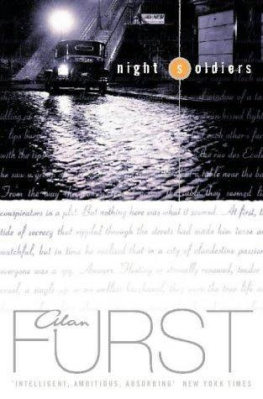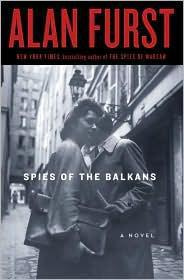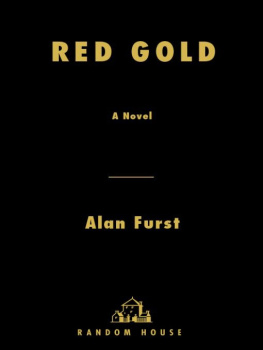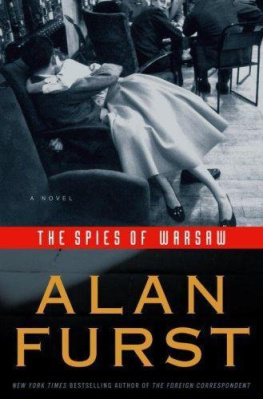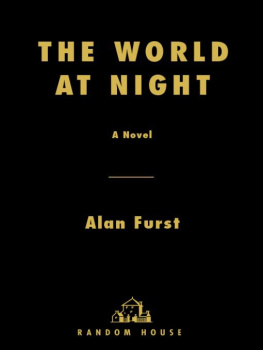Alan Furst - The Foreign Correspondent
Here you can read online Alan Furst - The Foreign Correspondent full text of the book (entire story) in english for free. Download pdf and epub, get meaning, cover and reviews about this ebook. genre: Detective and thriller. Description of the work, (preface) as well as reviews are available. Best literature library LitArk.com created for fans of good reading and offers a wide selection of genres:
Romance novel
Science fiction
Adventure
Detective
Science
History
Home and family
Prose
Art
Politics
Computer
Non-fiction
Religion
Business
Children
Humor
Choose a favorite category and find really read worthwhile books. Enjoy immersion in the world of imagination, feel the emotions of the characters or learn something new for yourself, make an fascinating discovery.

- Book:The Foreign Correspondent
- Author:
- Genre:
- Rating:5 / 5
- Favourites:Add to favourites
- Your mark:
- 100
- 1
- 2
- 3
- 4
- 5
The Foreign Correspondent: summary, description and annotation
We offer to read an annotation, description, summary or preface (depends on what the author of the book "The Foreign Correspondent" wrote himself). If you haven't found the necessary information about the book — write in the comments, we will try to find it.
The Foreign Correspondent — read online for free the complete book (whole text) full work
Below is the text of the book, divided by pages. System saving the place of the last page read, allows you to conveniently read the book "The Foreign Correspondent" online for free, without having to search again every time where you left off. Put a bookmark, and you can go to the page where you finished reading at any time.
Font size:
Interval:
Bookmark:
Alan Furst
The Foreign Correspondent
In the Resistenza
In Paris, the last days of autumn; a gray, troubled sky at daybreak, the fall of twilight at noon, followed, at seven-thirty, by slanting rains and black umbrellas as the people of the city hurried home past the bare trees. On the third of December, 1938, in the heart of the Seventh Arrondissement, a champagne-colored Lancia sedan turned the corner of the rue Saint-Dominique and rolled to a stop in the rue Augereau. Then the man in the backseat leaned forward for a moment and the chauffeur drove a few feet further and stopped again, this time in the shadow between two streetlamps.
The man in the back of the Lancia was called Ettore, il conte Amandola-the nineteenth Ettore, Hector, in the Amandola line, and count only the grandest of his titles. Closer to sixty than fifty, he had dark, slightly bulging eyes, as though life had surprised him, though it had never dared to do that, and a pink flush along his cheekbones, which suggested a bottle of wine with lunch, or excitement in the anticipation of an event planned for the evening. In fact, it was both. For the rest of his colors, he was a very silvery sort of man: his silver hair, gleaming with brilliantine, was brushed back to a smooth surface, and a thin silver mustache, trimmed daily with a scissors, traced his upper lip. Beneath a white wool overcoat, on the lapel of a gray silk suit, he wore a ribbon holding a silver Maltese cross on a blue enamel field, which meant he held the rank of cavaliere in the Order of the Crown of Italy. On the other lapel, the silver medal of the Italian Fascist party; a tipped square with diagonal fasces-a bundle of birch rods tied, with a red cord, to an axe. This symbolized the power of the consuls of the Roman Empire, who had the real rods and axe carried before them, and had the authority to beat with the birch rods, or behead with the axe.
Count Amandola looked at his watch, then rolled down the rear window and peered through the rain at a short street, the rue du Gros Caillou, that intersected the rue Augereau. From this point of observation-and he had twice made sure of it earlier that week-he could see the entry of the Hotel Colbert; a rather subtle entry, only the name in gold letters on the glass door, and a spill of light from the lobby that shone on the wet pavement. A rather subtle hotel, the Colbert, quiet, discreet, that catered to les affaires cinq-a-sept; amours conducted between five and seven, those flexible hours of the early evening. But, Amandola thought, a little taste of fame for you tomorrow. The hotel commissionaire, holding a large umbrella, left the entry and headed briskly down the street, toward the rue Saint-Dominique. Once more, Amandola looked at his watch. 7:32, it said. No, he thought, it is 1932 hours.
For this occasion, twenty-four-hour time, military time, was obviously the proper form. He was, after all, a major, had taken a commission in 1915, served in the Great War, and had the medals, and seven lavishly tailored uniforms, to prove it. Served with distinction-officially recognized-in the purchasing office of the Ministry of War, in Rome, where he had given orders, maintained discipline, read and signed forms and letters, and made and answered calls on the telephone, his military decorum scrupulous in every way.
And so it had remained, since 1927, in his tenure as a senior official in the Pubblica Sicurezza, the department of Public Security of the Ministry of the Interior, set up by Mussolinis chief of national police a year earlier. The work was not so different from his job during the war; the forms, the letters, the telephone, and the maintenance of discipline-his staff sat at attention at their desks, and formality was the rule in all discourse.
1944 hours. Rain drummed steadily on the roof of the Lancia and Amandola pulled his overcoat tighter, against the chill. Outside on the sidewalk, a maid-under her open raincoat a gray-and-white uniform-was pulled along by a dachshund wearing a sweater. As the dog sniffed at the pavement and began to circle, the maid squinted through the window at Amandola. Rude, the Parisians. He did not bother to turn away, simply looked through her, she did not exist. A few minutes later, a black square-bodied taxi pulled up to the entry of the Colbert. The commissionaire hopped out, leaving the door open, as a couple emerged from the lobby; he white-haired, tall and stooped, she younger, wearing a hat with a veil. They stood together under the commissionaires umbrella, she raised her veil and they kissed passionately-until next Tuesday, my beloved. Then the woman climbed into the taxi, the man tipped the commissionaire, raised his own umbrella, and strode around the corner.
1950 hours. Ecco, Bottini!
The chauffeur was watching his side-view mirror. Il galletto, he said. Yes, the cockerel, so they called him, for he did indeed strut. Heading along the rue Augereau toward the Colbert, he was the classical short man who refused to be short: posture erect, back stiff, chin high, chest out. Bottini was a Turinese lawyer who had emigrated to Paris in 1935, dissatisfied with the fascist policies of his native country. A dissatisfaction no doubt sharpened by a good public beating and a half a bottle of castor oil, administered by a Blackshirt action squad as a crowd gathered and gawked in silence. Always a liberal, probably a socialist, possibly a secret Communist, Amandola suspected-slippery as eels, these types-Bottini was a friend to the oppressed, and prominent in the friends-to-the-oppressed community.
But the problem with il galletto wasnt that he strutted, the problem was that he crowed. Arriving in Paris, he had naturally joined the Giustizia e Liberta-justice and liberty-organization, the largest and most determined group of the antifascist opposition, and then become editor of one of their clandestine newspapers, Liberazione, written in Paris, smuggled into Italy, then printed and covertly distributed. Infamita! This paper kicked like a mule; barbed, witty, knowing, and savage, with not a wisp of respect for Italys glorious fascismo or Il Duce or any of his achievements. But now, Amandola thought, this galletto was done crowing.
As Bottini turned the corner of the rue Augereau, he took off his steel-framed eyeglasses, wiped the rain from the lenses with a large white handkerchief, and put the glasses in a case. Then he entered the hotel. He was precisely on schedule, according to the surveillance reports. On Tuesday evenings, from eight to ten, always in Room 44, he would entertain his mistress, the wife of the French socialist politician LaCroix. LaCroix, who had headed one ministry, then another, in the Popular Front government. LaCroix, who stood beside the Prime Minister, Daladier, in the newspaper photographs. LaCroix, who dined at his club every Tuesday and played bridge until midnight.
It was 2015 before a taxi pulled up to the Colbert and Madame LaCroix emerged, and ran with tiny steps into the hotel. Amandola got only a glimpse of her-brick red hair, pointy white nose, a Rubenesque woman, fleshy and abundant. And greatly appetitious, according to the operatives whod rented Room 46 and eavesdropped on the other side of the wall. Subjects are vocal, and noisy, said one report. Describing, Amandola supposed, every sort of moan and squeal as the two went at their coupling like excited swine. Oh, he knew her sort; she liked her food and she liked her wine and she liked her naked pleasures-any and all of them no doubt, the full deck of naughty playing cards. Libertines. A full-length mirror faced the foot of the large bed in Room 44 and surely they took advantage of it, thrilled to watch themselves thrashing about, thrilled to watch-everything.
Font size:
Interval:
Bookmark:
Similar books «The Foreign Correspondent»
Look at similar books to The Foreign Correspondent. We have selected literature similar in name and meaning in the hope of providing readers with more options to find new, interesting, not yet read works.
Discussion, reviews of the book The Foreign Correspondent and just readers' own opinions. Leave your comments, write what you think about the work, its meaning or the main characters. Specify what exactly you liked and what you didn't like, and why you think so.

